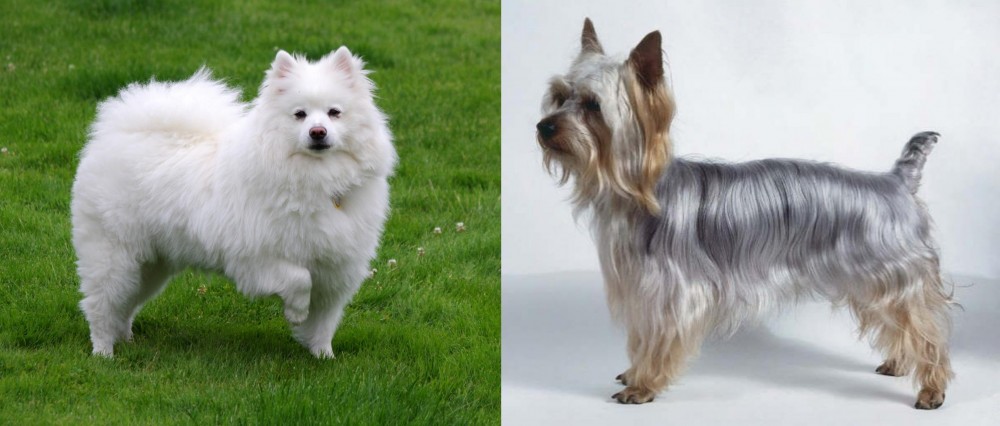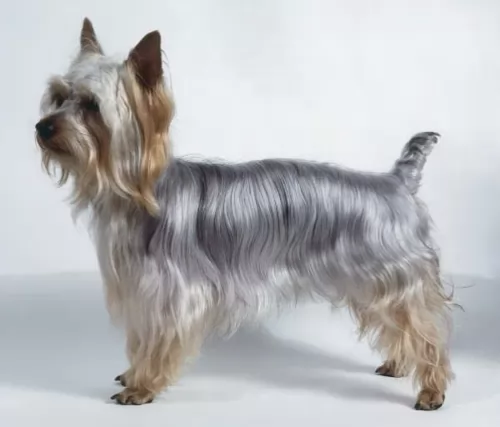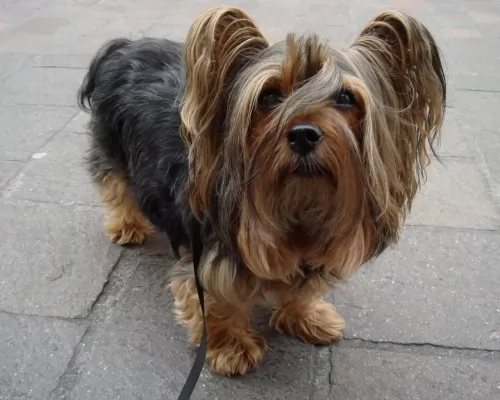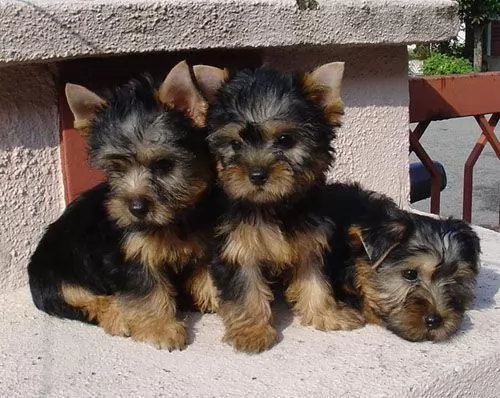 Petzlover
Petzlover American Eskimo Dog is originated from United States but Silky Terrier is originated from Australia. American Eskimo Dog may grow 22 cm / 9 inches higher than Silky Terrier. American Eskimo Dog may weigh 11 kg / 25 pounds more than Silky Terrier. Both American Eskimo Dog and Silky Terrier has almost same life span. Both American Eskimo Dog and Silky Terrier has same litter size. American Eskimo Dog requires High Maintenance. But Silky Terrier requires Moderate Maintenance
American Eskimo Dog is originated from United States but Silky Terrier is originated from Australia. American Eskimo Dog may grow 22 cm / 9 inches higher than Silky Terrier. American Eskimo Dog may weigh 11 kg / 25 pounds more than Silky Terrier. Both American Eskimo Dog and Silky Terrier has almost same life span. Both American Eskimo Dog and Silky Terrier has same litter size. American Eskimo Dog requires High Maintenance. But Silky Terrier requires Moderate Maintenance
 The American Eskimo is derived from the Nordic Spitz breed and most closely related to the German Spitz in particular. There were many German Spitzes in the United States at the time of the second World War and anti-German sentiment caused its name to change to the American Eskimo Dog. However, as the breed developed over time in the States, the American Eskimo became its own separate breed. In addition to the German Spitz, the American Eskimo is also related to the white Keeshond, the Samoyed, the white Italian Spitz and the white Pomeranian.
The history is beginning to show that the Spitzes that were brought to the US in the early 1900’s was white. This color was not popular in Europe but was quickly the favorite in the United States. They were originally working dogs on farms and ranches. They have excellent herding instincts, make goo watch and guard dogs, and good law enforcement sniff dogs. However, their first introduction to the American public was through the Cooper Brothers’ Railroad Circus and Stout’s Pal Pierre at the Barnum and Baily Circus. Eskimo puppies were sold after the circus show.
The American Eskimo is derived from the Nordic Spitz breed and most closely related to the German Spitz in particular. There were many German Spitzes in the United States at the time of the second World War and anti-German sentiment caused its name to change to the American Eskimo Dog. However, as the breed developed over time in the States, the American Eskimo became its own separate breed. In addition to the German Spitz, the American Eskimo is also related to the white Keeshond, the Samoyed, the white Italian Spitz and the white Pomeranian.
The history is beginning to show that the Spitzes that were brought to the US in the early 1900’s was white. This color was not popular in Europe but was quickly the favorite in the United States. They were originally working dogs on farms and ranches. They have excellent herding instincts, make goo watch and guard dogs, and good law enforcement sniff dogs. However, their first introduction to the American public was through the Cooper Brothers’ Railroad Circus and Stout’s Pal Pierre at the Barnum and Baily Circus. Eskimo puppies were sold after the circus show.
It was then that the breed became one of America’s favorite breeds and they quickly became house pets. Following World War II, Japan exported the Japanese Spitz into America and it was crossed with the Eskimo also. The American Eskimo Dog breed was not recognized by AKC until 1985. Still in 1958 there was no official breed club in the States but there were growing numbers of the dogs. It was not until 1970 did the National American Eskimo Dog Association (NAEDA) come into being. They collected the pedigrees of the first 1750 dogs to be AKC registered.
Since the American Eskimo Dog is not recognized internationally, those wishing to participate in international competition such as England’s prestigious Cruft’s Dog Show must register their dogs a German Spitz. Despite this the American Eskimo and German Spitz remain two very different breeds.
 It is the Yorkshire Terrier and the Australian Terrier which are the ancestors of the Australian Silky Terrier. This is by no means a new dog breed. It is believed that the breed came into existence at the end of the 19th century.
It is the Yorkshire Terrier and the Australian Terrier which are the ancestors of the Australian Silky Terrier. This is by no means a new dog breed. It is believed that the breed came into existence at the end of the 19th century.
The dog’s purpose is to be a companion. This little canine wasn’t always known as the Silky Terrier, but in 1955 the name became officially Silky Terrier.
The breed is also recognized by the Australia National Kennel Council in the Toy Group. In fact the breed is recognised by a number of the major kennel clubs as well as the Fédération Cynologique Internationale.
 This small to medium dog is beautiful and resembles a miniature Samoyed. There are three sizes of American Eskimo – the standard, miniature, and the toy. The Eskimo’s head is wedge shaped with tall, triangular, erect ears. It has a heavily plumed tail with a sharp curl over the back. The Eskimo can burst into bold action due to their good legs and feet.
This small to medium dog is beautiful and resembles a miniature Samoyed. There are three sizes of American Eskimo – the standard, miniature, and the toy. The Eskimo’s head is wedge shaped with tall, triangular, erect ears. It has a heavily plumed tail with a sharp curl over the back. The Eskimo can burst into bold action due to their good legs and feet.
The coat is a double one with a harsh outer coat and plush inner one. The coat is always white or white with cream or biscuit markings, and visible skin in gray or pink. The American Eskimo’s ruff or mane is very heavy, and the nose, eyelids, pads and gums are black. They have dark eyes and blue are not allowed.
 This is a small dog breed, standing at just 21 to 26cm in height and weighing in the region of 4 to 5kg. He may be a toy dog, but he is robust and athletic.
This is a small dog breed, standing at just 21 to 26cm in height and weighing in the region of 4 to 5kg. He may be a toy dog, but he is robust and athletic.
The ears of the Silky are small and erect with a lot of silky hair that hangs down and the tail is preferably docked and held high.
His coat is eye-catching – straight, long, silky and shiny. If it is left unclipped, it will reach the floor. The colour of the coat is a tan and silvery grey.
The temperament of any dog is affected by things such as heredity, upbringing and the training and socialization he receives.
Small he may be, but the Silky Terrier can benefit from training as he is feisty and strong willed.
He is energetic and always ready for action. He is ready to come bounding after you and join his human family for any action they’re into. He is playful, bold, loyal, tenacious, independent, social and lively and he makes a good playmate for children.
He might tend to be a bit snappy and aggressive towards other dogs. He is also great as a watchdog, barking and alerting you to strangers.
 The Eskimo is affectionate, playful and love children of all ages. They are intelligent and want to please you. They can be trained easily and are champions of the obedience trial. They are fun and confident. At the same time, they need a confident pack leader. He is prone to Little Dog Syndrome where the dog thinks they oversee the home and display all sorts of behaviors. Under these circumstances the American Eskimo can become obsessive, aggressive, and engaging in obsessive resource guarding and barking.
The Eskimo is affectionate, playful and love children of all ages. They are intelligent and want to please you. They can be trained easily and are champions of the obedience trial. They are fun and confident. At the same time, they need a confident pack leader. He is prone to Little Dog Syndrome where the dog thinks they oversee the home and display all sorts of behaviors. Under these circumstances the American Eskimo can become obsessive, aggressive, and engaging in obsessive resource guarding and barking.
 The silky terrier is a good choice for those who want a smallish dog but one which is robust and adventurous.
The silky terrier is a good choice for those who want a smallish dog but one which is robust and adventurous.
Your Silky is a loyal dog who loves spending time with his human family, wanting their companionship.
He will need to be physically and mentally stimulated as he is bright and intelligent. He can adapt to life in the city or the countryside but will need to be well exercised wherever he is.
 The American Eskimo Dog is prone to hip dysplasia. Their eyes and tear ducts are potential issues with progressive retinal atrophy. They are allergic to fleas and have a tendency to be overweight.
The American Eskimo Dog is prone to hip dysplasia. Their eyes and tear ducts are potential issues with progressive retinal atrophy. They are allergic to fleas and have a tendency to be overweight.
We deal with PRA (Progressive Retinal Atrophy) in greater detain in a following section but it is not as destructive as it used to be. It is much more treatable now.
There are potentially some dental issues that some American Eskimo Dogs are prone to.
 Just like most other dogs, the Silky Terrier isn’t likely to get sick easily, but he can still succumb to any one of the dog illnesses there are.
Just like most other dogs, the Silky Terrier isn’t likely to get sick easily, but he can still succumb to any one of the dog illnesses there are.
This is when your pet isn’t able to regulate blood sugar levels. Your dog will be drinking a lot more water than usual and also be urinating more often. The vet will explain to you a special diet for your pet and how the disease can be controlled with insulin.
This is a disease seen more often in smaller dogs like the Silky. It is caused by an obstruction in the airway and symptoms can include labored breathing and coughing. Your dog will need to be treated with anti-biotics and possibly surgery.
 Your American Eskimo Dog needs a high quality food so they will not get overweight. Make sure you know how much is appropriate for your particular dog and her specific age. The puppies should be fed twice a day but adults only once.
Your American Eskimo Dog needs a high quality food so they will not get overweight. Make sure you know how much is appropriate for your particular dog and her specific age. The puppies should be fed twice a day but adults only once.
As previously mentioned the American Eskimo Dog is prone to eye issue such as Progressive Retinal Atrophy or (PRA) – this disease is inherited and used to cause blindness as the rods in the retina died. New medical discoveries mean this is no longer a hopeless disease. Their eyes are also susceptible to other issues so make sure you check them and the tear ducts regularly.
Like so many other breeds the American Eskimo is also susceptible to hip dysplasia and a moving patella in the knee. For this reason watch their weight. They can also be very allergic.
This small dog has more energy than his size can handle. He needs a lot of exercise and a place to run. If he will become hyperactive and destructive. They are prone to disturbing behaviors such as spinning (spinning in circles) when they don’t get enough exercise. The American Eskimo Dog is smart and agile, Play games like catch or agility. They are also great at herding, competitive obedience or detection.
 You can imagine that with that silky hair, you’re going to have to be brushing your furry friend quite a bit. It’s such soft, silky hair that it easily picks up burrs and gets matted. You may want to get your pet to a professional groomer to have the hair cut. As you brush him, check for any unusual lumps and keep an eye on his skin.
You can imagine that with that silky hair, you’re going to have to be brushing your furry friend quite a bit. It’s such soft, silky hair that it easily picks up burrs and gets matted. You may want to get your pet to a professional groomer to have the hair cut. As you brush him, check for any unusual lumps and keep an eye on his skin.
Check your pet’s teeth. Bad teeth can cause bacteria that can affect every part of your dog’s body. Check inside his ears for redness and check his eyes that there is no discharge. Trim the nails. If you don’t have the time or the inclination to do all these things for him, make an appointment with the professional pet groomers who will do it for you.
The Silky Terrier will need quality food if you want him to enjoy a long, healthy life. Its always a good idea to have some of the top quality commercially manufactured dog foods with you for convenience. If you want to give him the best there is, some home-made food will be a good choice, if you keep it simple.
Boiled chicken, brown rice or pasta and spinach, sweet potatoes and carrots are a healthy choice for your pet – plain and simple without any exotic spices that could upset his stomach. Your dog will lap it up and you will see how he loves it. Chop the home-made food up and add some of it into his dry kibble as a treat twice a week.